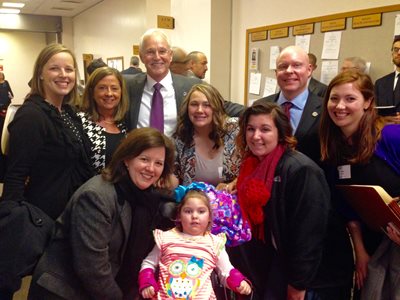Attorney and advocate, Sara Beth Myers, discusses Tennessee's CMV legislation
 Tennessee recently became the sixth state in the nation to pass CMV legislation in its second year after introduction. Tennessee Senate Bill 2097/House Bill 2397 received unanimous supporting votes in both the House and the Senate and faced no opposition from outside groups in its second year. But how? And why?
Tennessee recently became the sixth state in the nation to pass CMV legislation in its second year after introduction. Tennessee Senate Bill 2097/House Bill 2397 received unanimous supporting votes in both the House and the Senate and faced no opposition from outside groups in its second year. But how? And why?
We spoke with Sara Beth Myers, attorney and founding President of AWAKE - Advocates for Women's And Kids' Equality, who spearheaded the Tennessee effort to learn more about the process and their unique approach to this year’s successful legislation.
First off, congratulations to Team Tennessee and AWAKE for passing--you are state #6!
Thank you! It was a hard-fought battle these past two years. We started with one approach, but we had to change course. We got a lot of opposition and it was unexpectedly hard to work with our state’s DOH (Department of Health), but we found another way, we did it, and I’m so glad we did.
So tell me about your background and what led you to advocacy work.
I’m the President and Founder of AWAKE - Advocates for Women's And Kids' Equality, a new grassroots organization that I helped form in 2013. When we formed, we wanted to make sure that the issues in Tennessee that affect women and kids were being addressed and we became an official 501(c)(3) last summer. Our bills, so far, have been about updating or addressing issues that affect women and children in a negative way. The CMV bill has been our only health bill to date.
And you’re also a mom…
Yes! I’m also a mother of two kids, ages 4 and 2. My 4 year old daughter was born with a congenital heart defect, so we’ve been through a lot of medical issues and lots of hospital time. But I’ve learned that there’s a major difference between that and CMV: I couldn’t have prevented my daughter’s heart condition. With CMV, there’s a bunch of behaviors that you can change to prevent it, but congenital heart disease can be genetic.
So why tackle the issue of CMV? Did you know anyone affected by CMV?
Back in 2013, AWAKE’s treasurer had a neighbor whose grandson had passed away shortly after birth due to complications from CMV. We all said, “What is CMV”? We’d had kids and had never heard of it, so we started researching and we found the Utah law. We read that 1 in 150 babies were born with CMV and so we went to our state’s DOH to figure out how many babies were born with it in Tennessee and to start trying to work with them on legislation.
The CMV bill that passed in recent weeks was in its second iteration. A bill last year’s session didn’t pass…why was that and what made this bill better or stronger?
Our original legislation looked so close to Utah’s bill, but we had to take a different angle than the other states after the first year. We had really wanted to try to go about it through the DOH like Utah and the other states have but, in our state, the DOH wasn’t willing to support any legislation with a fiscal impact. Even if educating people was with just a pamphlet or flyer--that costs money so our DOH wouldn’t get behind the bill. It was extremely frustrating because we just wanted to get the information about CMV out. We had to devise a way that we could educate women who needed the information the most without costing money. So we decided to go through the physician patient relationship itself versus a state agency that would have to foot the bill and create and distribute materials. Now, the CMV information instead goes straight from the provider to the patient and the provider can give the information in any way they want; orally, pamphlet, or website.
You had some local inspiration from another bill in Tennessee?
Yes, we based the bill’s wording on a recent breast cancer bill in Tennessee that passed unanimously. We structured it in a similar way to this bill so that the healthcare provider determines whether or not a patient is at risk for contracting CMV, particularly women who are daycare providers or who work with or have small kids at home. We also changed the wording so that either the facility or the provider could provide the information. This took the responsibility off of the provider and made it so that the facility could do this as well--the receptionist or nurse who gives out the newly pregnant packet. We think it’s another avenue for getting this information out.
And it’s been well received by physicians?
It’s been very well received. As we talk to providers, what they say is that they’d like to just include CMV information in a packet for the patient rather than have to do the case by case verbal counseling. What also sold it was the disclaimer of liability, which was also modeled after Tennessee’s breast cancer bill. There will be no medical malpractice suits for not providing this information. We think it will become standard practice. And if it becomes standard practice, it will become the standard of care over time.
How did the Tennessee Medical Association (TMA) respond the second time around?
This year, the TMA didn’t take a formal position on the bill. When we met with them, they were originally concerned about the provider and this bill being a mandate because of the word “shall” in the bill. When we explained that the provider would still have discretion whether or not to tell the patient or even that the facility itself could tell the patient, that won the day in terms of our explanation that this was not a mandate. When the TMA testified in the House hearing this year, they said, “We have no problem with this bill”.
And how was the parent involvement in the process? Did their testimony help at the committee level?
Yes and it was amazing. Local parents came in to testify at the committee hearings both years. Rebekah McGill, Alissa Haun, and so many other parents came and did an amazing job! Other parents like Erica Layne attended behind-the-scenes meetings with agencies and legislators. The parents were very visible and the Committee remembered Alissa’s daughter, Raelyn, who came both years to testify. These families made all the difference because the Representatives need to see people from all backgrounds and all parts of their state affected by this. They need to hear their stories and then hear that CMV is preventable.
In addition to the dedication and perseverance of these amazing families, this victory could not have been accomplished without AWAKE's team of volunteer advocates, especially Megan Metcalf, Alanna Dodd, and Anna Carella.
 Are there any unintended or intended consequences of the bill?
Are there any unintended or intended consequences of the bill?
We think so. One of the best parts of the bill is that it will affect CME (continuing medical education) credits because physicians need to be briefed on any new laws that may affect them and their practice. This will be an opportunity to educate the providers about CMV and will give them an opportunity to review materials so that they can better inform their patients about CMV.
What advice would you give to partners and advocates seeking to pursue CMV legislation in their state?
You also have to understand the political climate in your region and you have to think very carefully about who you think would be most effective to sponsor the bill—their background and their relationships. We took a completely different tack in the second year and even switched sponsors because we were told that we needed a conservative on both sides of the bill. (Tennessee has a Republican supermajority.)
Also be creative! It’s important to see the big picture and decide what you think you can accomplish in your state. If it’s not what the other states have done, what is another way that you could try to get CMV awareness out there? We want to see more patients getting this information and it’s so different from other conditions, including my daughter’s congenital heart defect because, with CMV, there’s a bunch of behaviors that you can change to prevent it. And I told this to people throughout this whole process: we can’t prevent my daughter’s heart defect, we can’t prevent autism and other conditions, but this is something that we CAN do and something that we CAN prevent. Behavior modification can impact public health—look at smoking cessation and folic acid. We need to do the same for CMV and I’m so glad we could be a part of this effort in Tennessee.
Summary of Tennessee SB2097/HB2397
This bill requires a healthcare provider who assumes responsibility for the prenatal care of either pregnant women during gestation or women who may become pregnant to give such women the following information regarding cytomegalovirus (CMV), if the provider has determined that the patient is at risk of contracting CMV:
(1) The incidence of CMV;
(2) The transmission of CMV to at-risk women who are pregnant or who may become pregnant;
(3) Birth defects caused by congenital CMV;
(4) Methods of diagnosing congenital CMV; and
(5) Available preventative measures.
This bill encourages such healthcare providers to provide all other patients with information identifying where the patients can learn about CMV.
This bill specifies that it does not create or impose liability for failing to comply with the requirements of this bill, and that it does not create a duty of care or other legal obligation beyond the requirements set forth in this bill.
Posted: 3/22/2016
Category: Advocacy